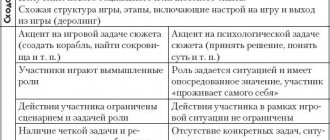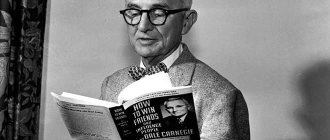Self-belief and self-confidence are the key secrets to success. A person with higher intelligence (IQ), talent and knowledge can only achieve success if he/she is convinced of it.
Let us note that confidence comes through knowledge, which gives us certain messages and lessons. So, books can give us this knowledge and experience. That is why we have compiled for you a list of 15 literary works that will definitely help you believe in yourself and realize your true strength.
Rating of books to raise self-esteem
The one who is truly confident is the one who does not rely on the words of others. Self-esteem is formed inside, lives long, helps to achieve goals, unlike an empty episodic demonstration. We identified a number of criteria on the basis of which we selected books to increase self-esteem:
- Subject;
- Writer's experience;
- Availability of practical advice;
- Narrative style;
- Depth of theory.
In addition to the above criteria, we relied on psychological facts, literature lists of authors, and recommendations of users who were helped by the selected therapies. We analyzed interest in the topic, the number of requests, benefits, quality of instructions, annotations, page volume, cover attractiveness, and other ratings to create an objective picture.
Readers often experienced a deterioration in their lives due to low self-esteem: they were embarrassed to talk to their bosses about raising their salaries, endured reprimands in queues and public transport, and felt unhappy due to imaginary inferiority.
According to experts, there are 3 options for solving the problem: auto-training, psychotherapy, and advice from psychologists. The books have already proven their effectiveness, helping thousands of people gain confidence in themselves and qualitatively change their lives.
We have selected works by foreign and domestic authors that can help cope with stress, get rid of doubts, establish harmonious relationships and believe in your own uniqueness.
Developing Confidence in Children
The origins of self-confidence are laid in childhood; in the process of communicating with loved ones, a child learns whether he is good or bad, and forms internal self-esteem, which affects him in adulthood. A child's self-confidence largely depends on his parents. Children cannot critically perceive information; the words of adults are taken at face value.
Key tips for developing confidence in children:
Don’t say: “you’re bad, we don’t love you,” it’s better: “you shouldn’t do that, because...” or: “you’re a good girl, but you did it wrong, because...”; A child should always feel the love and support of loved ones to develop and improve knowledge and skills; Stimulate the growth of confidence by overcoming feasible obstacles, first with support, later on your own; Be sure to praise for achievements and successes, this is so important for children, you can also keep a success diary to increase self-esteem; Compare less with other children, each child develops at his own pace, has characteristics of the body, memory, perception of the world, rely on the positive, stimulate development.
High self-confidence is the key to success for a child, his activity in social life, achievements in studies and sports. Only faith in your own strength works wonders and makes it easier to cope with the difficulties of life.
The question “How to develop self-confidence,” regarding children, applies more to parents, they lay the foundations of their worldview and perception of themselves as individuals, be careful in words, expressions, and actions.
The best books to boost self-esteem
Demonstration of confidence is characteristic of public figures and depends on external factors. True confidence is formed not from achievements and compliments, but from within the individual. Any books that increase the self-esteem of women and men are only instructions that are used for the benefit of the goal - to motivate yourself, to be in good shape.
M. Labkovsky “I want and I will.” Accept yourself, love life and become happy"
A psychologist with 35 years of experience reveals the causes of problems with self-esteem - continuous comparisons, concessions, inability to stand up for oneself. The book is filled with examples, photographs and quotes.
In his opinion, the guideline in life is self-realization, and healthy self-esteem begins with it. The first “alarm bell” is the simulation of non-existent situations, instead of experiencing specific events, awareness of external stimuli. The book gives answers on how to find harmony with yourself, raise healthy children, and not go crazy from continuous irritation, workload, and loneliness.
The author put forward six simple rules, which over time become a mantra that the brain learns throughout the book and involuntarily recalls in difficult situations. Readers gradually learn to listen and hear, correctly define personal boundaries, and let go of excessive control.
Advantages:
- The causes of dependencies are described;
- The reasoning is supported by humorous examples;
- The author has extensive experience in psychology;
- Detailed description, consolidation of theory.
Flaws:
- There are many mistakes, contradictions, harsh reasoning;
- Few specifics.
People with visual thinking will like it, since many vivid life examples and photographs form specific associations with personal problems, and with the help of humor they are fixed in memory and encourage recovery.
R. Anthony “The Main Secrets of Absolute Self-Confidence”
The book is filled with life quotes, talks about complex ideas in a simple style, helps you find a language with people, and open up to the world. The topics are combined into a kind of mini-course, enclosed in blocks and sections that work through the problem in practice. The examples are written based on 30 years of life experience of the author, who received a doctorate in cognitive psychology.
The author argues that developing willpower is only one of the paths to healthy self-esteem. A creative lifestyle leads to a crisis, exhaustion of vital energy, depression, if the priorities are on the wrong things, and the quality of communication remains low, with elements of toxicity, mutual humiliation, and envy.
The book is a kind of instruction for an objective look at the environment. After reading, self-love, a healthy assessment of opportunities, a correct perception of the environment, organization, and optimism are formed.
Over the course of 14 chapters, the author gives practical advice for daily implementation. The secret of managing time is simple: just want to do it, not express a wish.
Advantages:
- Clear step-by-step instructions;
- Brief information;
- A good place to start thinking;
- Effective motivation;
- Structured reasoning.
Flaws:
- Lots of deep subtext;
- Some exercises are ineffective.
Working through problems with mood, anxiety, social phobia, perception of criticism, and one’s own mistakes gradually helps to let go of resentment, accept differences of opinion, open up, and become oneself. This book, despite its simple cover, treats complex things that are important to repeat daily, like a mantra.
J. Rapson, K. English “Praise me. How to stop depending on other people's opinions and gain self-confidence"
Low self-esteem is indicated by the concept of “fame” - the desire to be liked, despite needs. The reasons for fame are given on the pages. Nice people are characterized by constant anxiety, uncertainty, and dependence on the words of others.
A nice person is characterized by non-conflict, fear of ordinary situations, following the preferences of loved ones, and compliance with personal comfort. The book contains 7 practices put forward by two professional masters - a family psychotherapist and a popular science writer.
The practices are presented sequentially, with an analysis of the reasons for low self-esteem. They help achieve harmony in your personal life, believe in yourself, and get rid of the fear of conflicts.
Advantages:
- Systematic presentation;
- Brevity;
- Available syllable;
- Lots of realistic examples.
Flaws:
- Solves only 2 problems: with conflicts, personal space.
Readers learned to give priority to themselves, to maintain a reasonable balance with the interests of others.
P. Frank “How to become confident in yourself”
A popular French writer suggests changing your life in 6 minutes of fun exercises. He argues that people are individual and multifaceted. Everyone can clear their minds, come to harmony and self-love.
The book was written for people who have no place in the world, who consider themselves empty and useless. With each exercise completed and theory read, motivation will grow, and a feeling close to confidence will appear. Daily exercises will get rid of thoughts of unfulfillment, teach you to identify shortcomings, find strengths, and work on self-esteem.
Advantages:
- Simple syllable;
- Many effective methods;
- 6 Minute Daily Technique;
- Effective motivation.
Flaws:
- Not enough practice.
The reader will become a kind of coach for himself and will get rid of thoughts in the style of “I’m not like everyone else.” Thoughts transform into “I’m not like everyone else - and that’s wonderful!
B. Brown "Gifts of Imperfection"
The title of the book reflects the theme: how shame, fear of shortcomings, and sincerity turn people into unhappy neurotics with low self-esteem. The Master of Social Work talks about his own transformation, how vulnerability and shame in the face of naturalness gradually turns into courage if you use the art of persuasion.
The main motto of the book “To be, not to seem” is revealed in the love for imperfections imposed by the epidemic of shame. The book is useful for those who have faced self-rejection throughout their lives. One reader wrote: “Shame loves silence and does not tolerate publicity.” If an unpleasant situation occurs, honestly share your experiences with your loved ones.
Advantages:
- Available syllable;
- Sincere techniques;
- Quality advice;
- No moralizing;
- Structured content.
Flaws:
- Superficiality of judgments.
The author easily talks about the shortcomings that she turned in her favor, how they helped in life and became a kind of impetus to achieve her goal. The book should be read by those who want not to doubt themselves, to live fully, and not to be afraid of difficulties.
M. Reklau “Love yourself first!”
The book is needed by those who are always doubting, lost, afraid, those who are looking for vital energy to fulfill their goals. According to the author’s idea, for a month you need to work on techniques that you don’t like or “don’t suit” - this will lead to a change in beliefs about your abilities, character, and environment.
The author went through a thorny path: he quit his job, learned to live differently, and value himself. He read self-esteem and confidence-boosting books to create a 100-point plan that he practices daily. These points helped him find his calling, be fulfilled in his family and professional life, and maintain his health.
The value of character, abilities, thoughts comes not from people, but from personal qualities. This statement is treated in six chapters. The first is devoted to the assessment of others, the second - to self-esteem, the third and fourth - to the attitude towards criticism and mistakes, the fifth and sixth - to the benefits of high self-esteem.
The reward after reading will be increased self-esteem, improved personal and work relationships, and the formation of self-confidence. Unconstructive criticism will stop hurting you, anxiety, depression, and fear of difficulties will recede.
Advantages:
- Brief, interesting presentation;
- Lots of practices, recommendations for gaining vital energy;
- Fixing the material;
- Effective motivation.
Flaws:
- Common truths;
- Not enough exercise.
Guilt is illusory and keeps you captive. To get rid of it, live in the present, look for dignity in everything, filter your environment.
V. Levi “The art of being yourself”
A book about the art of self-government, understanding one’s own needs, defeating illnesses and unlocking one’s potential. It will help those who do not accept themselves physically and cannot control the desire to eat during bouts of stress. An experienced practicing psychologist from the 80s claims: psychological problems can be solved by reasonable hunger, improving eating behavior, and improving the quality of rest.
Delicious tea, a good book, 40-minute meditation - everything you need to relax. The described exercises, techniques, and auto-trainings will help you find harmony with your own body.
Advantages:
- Theory is intertwined with practice;
- Exercises to work on yourself;
- Interesting opinion of the author;
- Effective motivation.
Flaws:
- Few examples;
- Fragmentation of thoughts.
The theory is presented as a professional conversation - complex, detailed, with some gaps that the reader fills in himself. Some people advise returning to the book periodically.
O. Primachenko “Tenderly to yourself”
The author suggests plunging into a 31-day practice of self-tenderness, where he teaches you how to organize space, set priorities, and get rid of garbage in your head. The book has the motto “Get out of your comfort zone!” Everyone will find the truth for themselves in the chapters entitled “Tenderness”. The epigraphs are presented as excerpts from poems authored by the poetess Zheludeva.
Advantages:
- Motivational moments;
- A careful approach to the reader;
- Gradual getting rid of stereotypical attitudes;
- Recommendations and practices to improve your life.
Flaws:
- Common truths.
Reveals stereotypical attitudes in finances, growing up, material space, bodily desires, priorities, feelings, goals. Gradually, the reader frees himself from labels, gains freedom of thought, and self-love.
B. Litvak “7 steps to stable self-esteem”
A program for developing self-esteem from a business coach will help determine the type of relationship with the world, show psychological mechanisms, development paths, talk about success, and choosing a partner.
The author offers solutions and gives tasks so that the reader can track his own motives. After reading, responsibility for decisions will no longer be too heavy a burden, and complex issues will become easier to solve.
Advantages:
- Light syllable;
- Examples from life;
- Construction from general to specific;
- Help in determining self-esteem.
Flaws:
- Lots of theory.
Suitable for people who want to adjust their behavior, learn to understand others, evaluate merit objectively, and choose the job they like.
N. Narain, K. Narain Phillips “Love yourself. Secrets of caring for soul and body"
The pages contain lifehacks for health and quality relationships, anti-stress recommendations from two sisters - a professional yoga teacher and a chef. Throughout childhood, they searched for effective means of love through massage, yoga, ki energy, learned to understand desires, take responsibility for decisions, and live in harmony with the inner child.
The siblings experienced early adult life, conflicts with family, uncertainty and disappointment in their goals. From personal experience, we were convinced that the main person with whom there should be harmony is the inner self. The sisters say: you need to take care of yourself, treat yourself like a child or friend - with patience, pride, trust, pamper with delicious food, good sleep, gifts.
Advantages:
- Advice on nutrition, psychological self-regulation, daily routine;
- Simple syllable;
- Healthy baking recipes;
- Building healthy self-esteem through body relaxation.
Flaws:
- Common truths.
The books do not contain deep thoughts, but they help you find a language with your body, fall in love with physical features, and find harmony with your soul through meditation and healthy recipes.
The best books by Stephen King
Free courses
For those who are not yet ready to pay for online courses, I have several excellent free programs - start with them. And be sure to read our article Where to start self-development, it contains a lot of useful information.
“Decision Making” by 4brain
Decision making is a free course on the 4brain brain development platform. It contains 5 lessons for self-study + an exam at the end. The goal of the course is to develop decision-making algorithms for participants in any situation.
In a programme:
- consideration of the reasons for indecisiveness and complexity of decision-making;
- searching for all possible solutions;
- training in correct prioritization;
- mastering ways to select the optimal solution from all possible options;
- evaluation of decisions made and accounting for mistakes made.
“How to find the strength to grow and develop?” from Advance
How to find strength for growth and development? – free webinar from the Advance Information Technology Center. I have already written about my love for this school in the article Self-development courses, and now you have the opportunity to try its products for yourself.
The webinar is moderated by the center’s general director, Alexander Zgoda. This is a man who managed to graduate from school at the age of 14, from university at 20, and at 21 he opened his own law firm. He knows firsthand the enormous importance motivation and self-discipline play on the path to success, and is ready to share his personal tricks and life hacks.
At the webinar you will learn:
- why being lazy is completely normal and natural for a person;
- how to “negotiate” with your laziness so that both you and she are satisfied;
- what tricks can be used to deceive laziness and procrastination;
- how to properly combine work and rest.
I highly recommend participating in this webinar. In addition to useful practical advice, you will also receive a powerful charge of motivation for development.
“Priority setting algorithm” from CROSS Online Academy
Priority setting algorithm - video course from the CROSS Online Academy, the founder of which is the outstanding psychotherapist, author of 35 books, Mikhail Litvak. The course consists of 4 lessons, after completing which you will be able to organize all areas of your life and organize your affairs and goals.
You will learn:
- how to rank and prioritize your values;
- what happens when we set our priorities wrong;
- How to avoid mistakes in this process.
To gain access to the course, you need to submit an application on the website.
“How to overcome laziness and get crazy motivation” from Neurosophy
How to overcome laziness and get crazy motivation - a free master class from the Neurosophy project. This is not a motivational training where you get a dose of inspiring speeches and go home. This is a practical lesson on mastering methods of managing motivation from the inside. These methods are based on deep systemic knowledge about the structure of the brain and the functioning of the endocrine system.
At the master class you will learn:
- how to plan and follow plans effectively;
- how to cope with procrastination, laziness, low productivity and other enemies of a successful person;
- how to bring all your affairs to completion;
- how to get your routine in order and start getting enough sleep;
- how to increase self confidence.
“Time Management: Time Management” from 4brain
Time management: time management - a free course for self-study. It will introduce you to the basics of time management and help you develop good habits. Consists of 5 lessons and a final exam. Each lesson ends with a short test to consolidate the material. The authors of the course are Sergey Krutko, Kirill Nogales and Artem Zakharov.
Program:
- Basics of time management.
- Goal setting.
- Planning.
- Time management systems.
- Tools.
At the end you will find a list of useful literature for continuing your studies with a detailed description.
3 exercises for laziness from Konstantin Dovlatov
3 exercises against laziness from one of the most popular coaches in Russia, Konstantin Dovlatov. They will help you finally get off the couch and start moving towards your goals.
You will learn:
- how to charge your internal battery in 17 seconds;
- how to restore strength after long work;
- how to make faith in your strength stronger than laziness;
- how to stop procrastinating.
How to choose a book to boost self-esteem
Books for raising self-esteem and confidence are different for each type of person. Thinking is sensory and intuitively receptive. “Sensorics” comprehend harmony through quality sleep, pleasant clothes, delicious food, and personal space. “Intuitives” prefer non-standard ideas, bright costumes, pleasant music, and risks. Each book in the rating is described in a certain way - all that remains is to collect the descriptions bit by bit and determine how you think.
Subjects
Self-esteem can be stable and unstable. Stable negative self-esteem requires deep work with motivational exercises. For those who are unstable, auto-training and physical relaxants are suitable.
The topics of books on self-esteem are divided into 3 types:
- For people with low soul self-esteem;
- For people with low body self-esteem;
- For people with general low self-esteem.
The first 3 books from the rating are perfect for the first type. The last 2 will give harmony with the body. The rest depend on the severity of the two types or are suitable for a combined problem.
Author
If you need more practice, consider the author’s experience in auto-training, meditation, and coaching. The theory is well presented by professionals in the field of writing, philosophy, and journalism. Business coaches are excellent at conveying self-worth through work, achievements, and colleagues. If you need a combination, pay attention to the classics from experienced psychologists.
Quality practical advice
The quality of practical advice is determined by the type of thinking - sensory or intuitive, experience in reading psychological literature, age, personal principles. If you need advice on changing your thinking or behavior, then the practice of healthy eating and muscle relaxation will not be effective.
The best math textbooks
Which book is better for raising self-esteem?
We rush between the beauty and wretchedness of our own bodies, neglect personal desires, and are afraid of being selfish. This traumatizes the inner self. Only books that increase self-esteem and self-confidence keep you from numerous soul-searching, apathy, and irritation.
The VyborExpert.ru team, based on user preferences, analysis of personality types, and expert opinions, chose books to raise the self-esteem of different types of people:
- If it is difficult to come to terms with your character, self-esteem constantly fluctuates, opportunities are missed, there is no motivation to take on goals, we recommend the book by J. Rapson, K. English.
- If you want to study desires, habits, thoughts more, and direct yourself in the right direction, read the work of P. Frank.
- If it is difficult to accept the body and come to terms with its needs, take the book of the Narain sisters.
A book list created based on your thinking type will be an effective self-esteem therapy. Don’t forget about the balance between theory and practice, do the exercises daily, don’t be afraid of “unpleasant” techniques - and then you will gain confidence.
Characteristic signs
According to psychologists, a person’s confidence is manifested in the ability to make an objective assessment of one’s present actions in comparison with past experiences and strive to surpass oneself. The desire to compete with others, internal fears and complexes, laziness - all this can be overcome with the right approach.
Signs of a confident person (behavior):
- ability to make decisions independently;
- the ability to express one’s own opinion and give arguments;
- lack of fear of the audience, camera and other similar phobias of interacting with large numbers of people;
- calm communication with other people without discomfort;
- the ability to resolutely refuse and not offend the interlocutor;
- desire to negotiate and resolve conflict situations.
A person feels comfortable performing new actions. Confidence provides inner support that promotes achievement.











